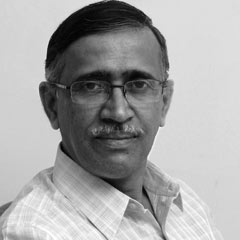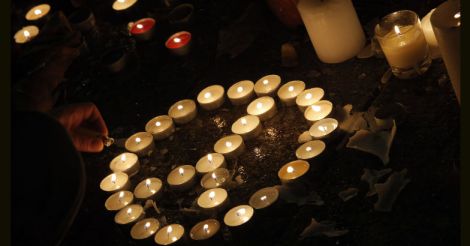Paris: George Pascal’s nimble fingers run over the piano’s keyboard. A group of people are enraptured by the music at the busy Gare de l’Est railway station in Paris.
This everyday public concert is sponsored by the commercial establishments at the station concourse. The melody sounded a bit out of place in a city that was a scene of carnage just four days ago.
“We will not let anyone stop the music,” a girl at a sandwich shop at the station said. “They killed hundreds of people at a concert to stop the music of Paris. We will not let it happen.”
The people of Paris made it a point to let the music flow even on the day after the terror attacks. The city folks are peeved at the administration’s decision to call off a few concerts planned as part of a convention on climate change this month.
The authorities, however, explain that they have cancelled very few programmes taking into consideration the safety of delegates at the convention.
The attacks on Friday night killed more than 120 people. The French embassy in New Delhi had a holiday on Saturday. Even so, the press attaché asked me to mail him the details of my passport when I called him up for obtaining visa.
The embassy staff saw to it that my application was received by Saturday evening. I was called to the embassy the next morning to receive my papers to visit France. Visa came along with a piece of advice:
“Take care. Always carry your passport and other identification papers. Anyone can be questioned. The grilling will start at the emigration at the airport. Carry a letter from your editor as well.”
When I landed at the Charles de Gaulle airport that afternoon, I realised with a shock that I had not taken a printout of the letter. As I was warned, the immigration office asked for a copy of the letter.
I showed the officer the passport page imprinted with visa just the day before and showed him the letter from my editor on my mobile phone’s inbox. He stamped my visa and wished me luck during my stay in the city.
I still hesitated: “Are there cabs running towards the city?” “How many do you want?” was the response. This is Paris. The French remain efficient in their everyday lives and committed to their music and dance in the face of any offensive.
I asked the taxi driver about the curfew. “The attack was on Friday. Not many Parisians venture outside on Saturday. But today, Paris is Paris again,” he said. Then where is the curfew that was in force?
“Oh. There are some sensitive spots where administrative offices are located. You can’t go loiter among those. That’s all,” he said. As we neared the city, he pointed to the left and said, “That’s Stade de France, where the terrorists struck amid a football match.”
Everything looks normal from the road. I was told there was a curfew in force around it considering the sensitive nature of the place.There was nothing unusual on the way to the city. Roads were crowded.
Traffic was in full flow. Shops, hotels, bars and night clubs were teeming with small crowds.Paris woke up on Monday as on any other Monday. Shops and other establishments did brisk business.
The only reminders to last week’s horror were the frequent police cars that rent the air with their sirens. Security arrangements were in place in the city centre where the government offices were situated. That area seemed less crowded.
The home minister’s press meet stood out with its heavy security cover. Outside the official zone, roads and metros were crowded as always. As dusk falls, Paris came alive with musical concerts, night clubs and bars.
The Culture Department had directed the famed museums in Paris, including the Louvre, to be in business from Monday morning.
So what about the national emergency? “Yes. There is an emergency in effect. Emergency only means that the government can limit some people’s rights for a short period,” explained a journalist.
In a nutshell, the emergency is just a curb on the liberal laws of France that allows even the propagation of religious extremism. This also allows law enforcement officers to put under house arrest anyone suspected to be trouble makers.
Curiously, even a one-minute silence at noon in memory of those perished in the attacks was not made compulsory.
The administration had given special directives to the offices not to insist on the observance of silence. This is Paris. The people of Paris know someone wanted their music to stop. And they have promised not to let it happen. Let the music and dance continue. Let freedom of speech prevail.




































































































































































































































































































































































































































































































































































































































 A woman lights candles outside the Bataclan concert hall, which was a site of last Friday's attacks, in Paris. AP
A woman lights candles outside the Bataclan concert hall, which was a site of last Friday's attacks, in Paris. AP
Disclaimer
The comments posted here/below/in the given space are not on behalf of Manorama. The person posting the comment will be in sole ownership of its responsibility. According to the central government's IT rules, obscene or offensive statement made against a person, religion, community or nation is a punishable offense, and legal action would be taken against people who indulge in such activities.